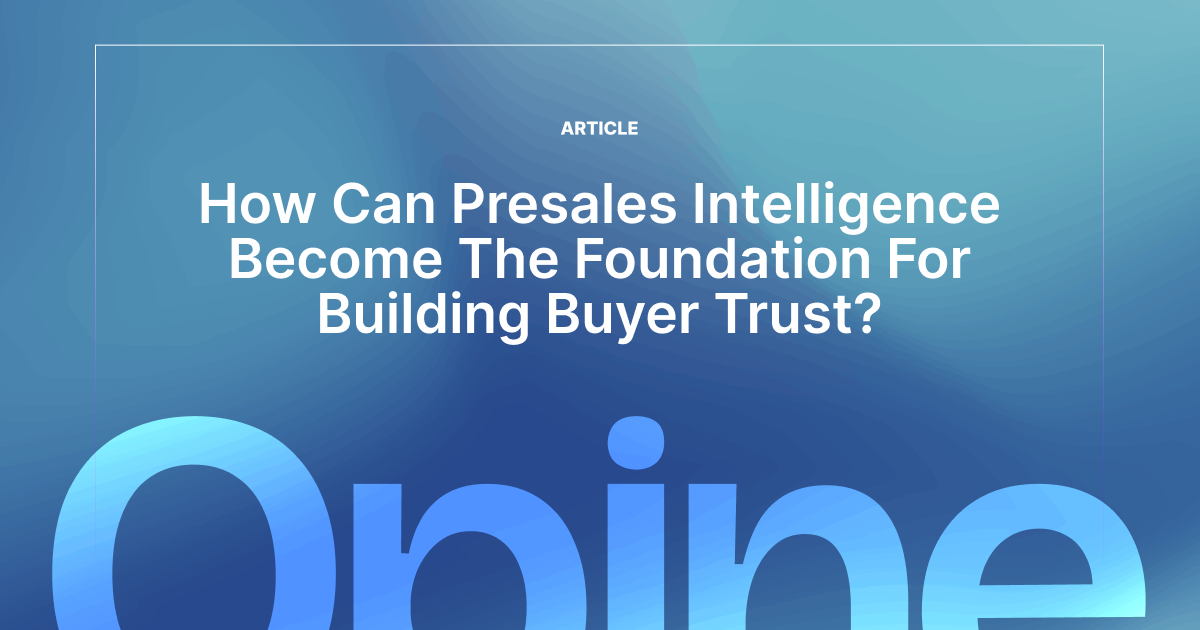How can presales intelligence become the foundation for building buyer trust?
Trust has become the ultimate currency in B2B sales, with 99% of decision-makers citing it as essential when selecting vendors. Yet building that trust requires more than polished pitches and product knowledge, it demands deep understanding of buyer needs before they even articulate them.
Enter presales intelligence: the systematic approach to gathering, analyzing, and applying data-driven insights throughout the buyer journey. This evolution from reactive selling to proactive problem-solving represents a fundamental shift in how successful sales teams operate today.
The stakes couldn't be higher as modern buyers arrive armed with research, skepticism, and specific expectations. Sales teams that harness presales intelligence effectively transform these informed buyers from skeptics into confident partners, creating lasting relationships built on demonstrated expertise rather than empty promises.
What Is Presales Intelligence and Why Does It Matter for Building Trust?
What are the core components of presales intelligence?
Presales intelligence represents far more than just another data collection exercise, it's the systematic orchestration of insights that transforms how sales teams understand and serve their buyers. At its core, presales intelligence encompasses the continuous gathering, analysis, and application of buyer behavior data, competitive insights, technical requirements, and historical deal patterns. This comprehensive approach creates a living, breathing knowledge base that evolves with each interaction.
Unlike traditional sales methodologies that rely on generic presentations and one-size-fits-all demos, presales intelligence enables teams to craft experiences tailored to each buyer's specific context. The intelligence framework typically includes:
- Real-time buyer behavior tracking: Monitoring engagement patterns across touchpoints to understand interest levels and priorities
- Competitive landscape analysis: Maintaining current knowledge of alternative solutions buyers are evaluating
- Technical requirements mapping: Documenting specific integration needs, compliance requirements, and infrastructure considerations
- Buyer experience insights: Capturing buyer feedback and engagement data to refine interactions and deliver a frictionless buyer journey
- Historical deal intelligence: Learning from past wins and losses to identify success patterns and potential obstacles
This multi-dimensional view transforms presales professionals from product presenters into strategic advisors who anticipate needs and provide solutions before buyers even recognize the gaps.
What is the direct connection between presales intelligence and buyer trust?
The relationship between presales intelligence and buyer trust isn't coincidental, it's causal. When buyers encounter sales teams who truly understand their industry challenges, speak their language, and present relevant solutions from the first interaction, trust begins to form naturally. This initial impression carries tremendous weight, as research indicates that buyers complete extensive research before ever engaging with vendors, arriving with preconceived notions and specific expectations.
Modern buyers face an overwhelming array of options and conflicting information. They've grown skeptical of vendor claims after experiencing too many misaligned solutions and overpromised capabilities. Presales intelligence directly addresses this skepticism by enabling teams to:
- Demonstrate immediate relevance: Opening conversations with industry-specific insights rather than generic introductions
- Anticipate unspoken concerns: Addressing common objections and implementation challenges before buyers voice them
- Provide evidence-based recommendations: Supporting suggestions with data from similar successful implementations
- Show investment in buyer success: Proving preparation through customized materials and targeted solutions
- Highlight competitive differentiation: Provide transparent comparisons with competitors to emphasize your solution’s unique strengths and demonstrate a clear value advantage.
This depth of preparation signals to buyers that they're dealing with professionals who value their time and understand their business, not just another vendor trying to hit quota. The trust that emerges from these intelligence-driven interactions creates a foundation for accelerated decision-making and stronger partnerships.
How can we build buyer trust through demonstrated expertise?
Presales intelligence transforms abstract product features into concrete business value by connecting capabilities directly to buyer-specific outcomes. This translation requires deep understanding of both the solution and the buyer's operational reality, knowledge that only comes from systematic intelligence gathering and analysis.
Consider how differently buyers respond when presales teams can reference similar companies in their industry who faced comparable challenges. Instead of theoretical benefits, conversations focus on actual results: implementation timelines based on organizations of similar size, ROI metrics from companies with comparable use cases, and honest assessments of potential obstacles based on historical data. This specificity builds credibility that generic case studies simply cannot match.
The trust-building power of presales intelligence extends beyond individual interactions. When every team member demonstrates consistent knowledge and provides aligned recommendations, buyers experience the reliability that reinforces their confidence in choosing the right partner. This consistency, powered by centralized intelligence platforms, eliminates the confusion and doubt that arise when different team members provide conflicting information or outdated details.
How can presales transform our buyer interactions?
How can data‑driven insights enable personalization at scale?
Presales intelligence elevates personalization by harnessing advanced analytics, enabling sales teams to design demonstrations and proposals that align closely with each buyer's specific challenges and objectives. By examining historical interactions, industry patterns, and detailed company data, teams gain the ability to anticipate buyer needs before they're overtly expressed. This goes beyond providing a basic solution, it's about conveying a deep understanding of the buyer's unique business landscape.
- Bespoke Positioning: Leveraging insights from analogous cases helps craft messaging that aligns perfectly with particular buyer requirements.
- Insight Gathering: Analyzing data trends allows for the anticipation of buyer inquiries, facilitating proactive “trap-setting” in competitive and build v. buy scenarios.
How can we proactively solve buyer problems before they ask?
With presales intelligence, teams gain the foresight to address potential obstacles, technical issues, and implementation challenges before they can hinder progress. Equipped with insights from comparable deals and buyer profiles, teams can preemptively tackle concerns during early conversations. This proactive stance distinguishes trusted advisors from ordinary vendors, highlighting a commitment to thoroughness and expertise.
- Preemptive Challenge Identification: Understanding typical challenges in similar scenarios allows teams to prepare solutions proactively.
- Strategic Pre-emptive Solutions: Offering solutions to anticipated issues demonstrates a comprehensive grasp of the buyer’s journey.
How can presales intelligence help us adapt in real time to changing buyer needs?
Modern presales platforms deliver real-time insights during meetings, empowering teams to adjust conversations based on buyer responses and engagement levels. Intelligence systems monitor which features capture attention most, enabling instant modifications to demos and discussions to emphasize high-value aspects. This adaptive strategy shows buyers that the team is responsive to their needs, not just adhering to a predetermined script.
- Real-Time Engagement: Tailoring presentations on-the-fly to match buyer interest enhances interaction and demonstrates adaptability.
- Responsive Dialogue Modifications: Using live data to refine discussions ensures ongoing relevance and impact.
How can we build trust through consistent and accurate information delivery?
How can we establish a unified knowledge base for presales?
Presales intelligence platforms integrate all product details, pricing structures, technical data, and competitive insights. This integration ensures that every interaction with the buyer is consistent and reliable. Achieving this level of coherence isn't just beneficial, it's essential for trust. Buyers appreciate when the information they receive is uniform and dependable across all engagements.
- Comprehensive Information Repository: Bringing all necessary data into one system prevents errors that could lead to buyer confusion.
- Consistent Messaging: Ensuring uniform communication across channels builds confidence in the organization’s professionalism.
How can evidence‑based transparency strengthen buyer trust?
The era of vague assurances is over. Presales intelligence empowers teams to substantiate every statement with solid data and proven outcomes. This transparency transforms doubt into trust. Buyers no longer question the validity of claims, they witness the metrics, timelines, and successful results from similar implementations.
- Verified Outcomes: Demonstrating data-supported insights and success stories gives buyers the concrete proof necessary for decision-making.
- Commitment to Honesty: By consistently providing evidence-backed information, presales professionals uphold a standard of integrity and openness.
Presales intelligence reshapes the landscape of trust, making it a cornerstone of every buyer interaction.
How can strategic use of presales accelerate our buyers’ decision making?
How can presales streamline the evaluation process?
Presales intelligence equips teams to navigate the buyer journey with targeted precision. Recognizing the typical decision-making stages allows for timely delivery of tailored information. This isn't just efficient, it's about demonstrating respect for the buyer's time and showcasing organizational expertise.
- Tailored Insights Delivery: Anticipating buyer needs ensures that the right information reaches them exactly when required, avoiding unnecessary delays.
- Workflow Automation: Aligning content delivery with buyer milestones creates a seamless and engaging evaluation experience.
How can predictive insights reduce buyer risk?
The strength of presales intelligence lies in its foresight into potential challenges and opportunities. By leveraging historical data, teams can identify specific risks and success factors, allowing them to offer realistic projections and resource plans. This clarity builds trust and establishes the sales team as a dependable partner.
- Data-Driven Foresight: Utilizing past data to predict challenges and provide solutions instills confidence in buyers.
- Clear Expectation Setting: Presenting transparent expectations based on comparable experiences reassures buyers of the team’s dedication to achieving success.
Through strategic intelligence, presales teams enhance decision-making by transforming it into a clear, informed journey.
How can we leverage technology to scale trust‑building activities?
How can AI‑powered personalization and response systems enhance trust‑building?
Artificial intelligence revolutionizes how teams personalize interactions with buyers. By examining extensive datasets, AI identifies patterns and preferences that might escape manual analysis. This enables the creation of bespoke follow-ups, technical replies, and content suggestions that keep engagement high.
- Deep Data Insights: AI uncovers hidden buyer behaviors, informing precise personalization tactics.
- Automated Communication: Systems craft customized responses, allowing presales experts to concentrate on strategic, empathy-driven tasks.
This synergy between AI and human expertise ensures routine processes support the meaningful interactions that cultivate trust.
How can integrated platforms ensure omnichannel consistency that builds trust?
Today's buyers expect seamless interactions across various channels. Integrated presales platforms maintain consistent messaging across emails, calls, chats, and face-to-face meetings. This unified approach aligns with buyer priorities, strengthening trust through dependability and coherence.
- Consistent Messaging: Platforms deliver unified value propositions, ensuring a cohesive buyer experience.
- Trust Reinforcement: Reliable communication reassures buyers of the organization's dedication to their needs.
By fully embracing technology, organizations not only amplify their trust-building efforts but also enrich the buyer journey, nurturing enduring relationships.
How can we measure and optimize trust‑building effectiveness?
Which metrics should we track to gauge buyer confidence?
Effective metrics are essential for evaluating presales intelligence's role in building buyer trust. Analyzing engagement rates from personalized interactions compared to generic outreach helps teams assess their strategy's success. High engagement with customized communications indicates that the approach effectively resonates with buyers and builds trust.
- Decision Efficiency Metrics: Reduced evaluation times often result from data-driven methods that enhance buyer assurance and streamline decision-making.
- Success Rates and Deal Growth: Increased conversion rates and larger deal sizes reveal the impact of using intelligence to foster trust throughout the sales cycle.
These metrics offer a quantitative basis for understanding how presales activities shape buyer perceptions and decisions.
Why should presales intelligence avoid tribal knowledge?
The process doesn't conclude with the closing of a deal. To sustain and enhance trust-building efforts, presales teams should focus on continuous improvement through feedback loops. Capturing buyer insights, addressing objections, and refining strategies based on feedback help teams stay responsive.
- After-Action Reviews: Evaluating intelligence applications reveals which strategies most effectively instilled confidence and led to successful outcomes.
- Adaptive Strategies: By evolving in response to buyer needs and market shifts, teams ensure their trust-building techniques remain impactful and relevant.
This dedication to dynamic strategies not only strengthens current relationships but also prepares teams for future engagements, maintaining trust as a foundational element of sales success.
How can we implement presales intelligence for maximum trust impact?
How do we build a strong presales foundation?
Establishing a strong presales intelligence foundation starts with a comprehensive evaluation of existing processes. Identifying areas where intelligence can enhance interactions is essential. This means examining touchpoints where buyer engagement could improve. Investing in systems that integrate seamlessly with current workflows enhances efficiency. These systems should facilitate data sharing, providing a comprehensive view of buyer needs.
- Audit and Identify: Analyze current workflows to find areas needing intelligence-driven insights.
- Integrate and Optimize: Select systems that align with existing tools for streamlined data flow.
- Focus on Precision: Ensure insights are accurate and readily applicable.
How should we train our teams for intelligence driven selling?
Empowering teams requires tailored training programs focused on utilizing intelligence insights effectively. Developing resources that guide professionals on applying specific intelligence to different buyer scenarios ensures clarity and consistency. Encouraging a culture of ongoing learning motivates teams to share and refine their intelligence applications, enhancing trust-building techniques.
- Develop Tailored Programs: Create training focused on practical intelligence application.
- Craft Comprehensive Guides: Offer resources on using intelligence in various buyer contexts.
- Promote Continuous Learning: Encourage sharing of successful strategies within the team.
How can we scale presales success across our organization?
Maximizing the impact of presales intelligence involves establishing scalable practices. Documenting effective approaches ensures consistency across teams. Implementing feedback mechanisms provides insights into buyer responses, allowing for ongoing refinement. Celebrating achievements in trust-building underscores the value of intelligence in strengthening buyer confidence.
- Standardize and Document: Record effective trust-building approaches for team-wide use.
- Gather and Apply Feedback: Use buyer insights to continuously improve strategies.
- Recognize Achievements: Highlight successful applications to emphasize intelligence's role in trust-building.
The future of B2B sales belongs to teams who transform presales intelligence into their primary system for building buyer trust. By embracing data-driven insights, personalized interactions, and consistent delivery, you create the foundation for lasting partnerships that extend far beyond the initial sale.
Ready to revolutionize your approach? Schedule a demo to explore how Opine can optimize your presales process and discover how we can help you turn presales intelligence into your competitive advantage.
Get the latest in your inbox
Get weekly tips & strategies from your friends at Opine to close faster, reduce risk, and grow revenue.
Recent articles
Explore the Opine archive of blog articles on presales, sales, and customer success automation. From strategies, best practices, to angentic AI-driven revenue growth, you'll find it here.






